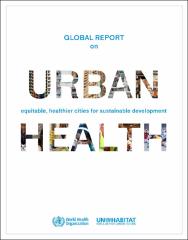Global report on urban health: equitable healthier cities for sustainable development
Summary
This report aims to help cities uncover health inequities with a focus on identifying solutions to resolving them. These are not simple problems – cities are complex systems where a multitude of factors affects people’s health. However, there are several clear pathways through which progress can be made. In order to reach the SDGs targets, and to achieve UHC, city decision-makers must act to strengthen health systems to create cities equitable and healthier cities. Accordingly, Section 1 presents the major urban health challenges that would need to be tackled in order to realize a vision for healthier cities. It presents evidence of deprived and high-risk populations within cities as well as
possible solutions to control preventable ill-health within them. It further reviews past evidence on urban health inequities, and presents a special analysis (MDG Scorecard) showing the likely effects of urban health inequities in achievement of the Millennium Development Goals (MDG) at the national level.
There is abundant evidence that some of the greatest health gains to be had in cities lie beyond the health sector. The urban environment itself plays an instrumental role in health because it affects the way we live our daily lives. The places where we live, work and play, and how we access these elements of daily life are increasingly impacting our health. This has particularly been a problem for many of the fastest growing cities, which have had neither the time nor the resources to plan for unanticipated growth. Still, throughout history, most of the world’s cities have been planned largely without human health in mind. Whether in planning for public spaces, energy use or transportation corridors, cities have often been planned primarily for commerce and cars. Cities can and should be planned for people in order to optimize the health of their residents, and maintain their economic and cultural vibrancy. Section 2 uncovers the pathways through which cities, as currently planned, affect the health of their residents. It demonstrates that not only can these effects be identified, but that there are also
practical ways to modify our cities and their structures to make them more conducive to
health and prosperity at the same time.
This report strongly advocates that cities adopt a multisectoral response by showing how individual components of city life – such as urban planning, housing, transport and energy – are interconnected and both separately and together have positive and negative health implications. This report also considers the challenges for health equity through these lenses and provides evidence of solutions for cities where people can thrive.
Invariably, challenges bring out the best in people – from the leaders of cities and their advisers to the communities and families who live in them. Section 3 discusses the characteristics of a multisectoral approach in urban governance which should be mobilized to effectively act on the various challenges and solutions that emerged in this report. There is something in this report for every city in the world, and for every city leader. They can relate to the challenges and adapt the problem-solving approaches to their own unique circumstances to make their own city a healthier and better place to live in during the coming decades of the 21st century.
Author/Editor
WHO - World Health Organization
Year
Themes
Planning & Design
Public Health
Regional & Metropolitan Planning
Resilience & Risk Reduction
Waste Management
Water & Sanitation
Youth & Livelihoods
Sustainable Development Goals
Goal 3 - Ensure healthy lives and promote well-being for all at all ages
Goal 11 - Make cities and human settlements inclusive, safe, resilient and sustainable
New Urban Agenda Commitments


